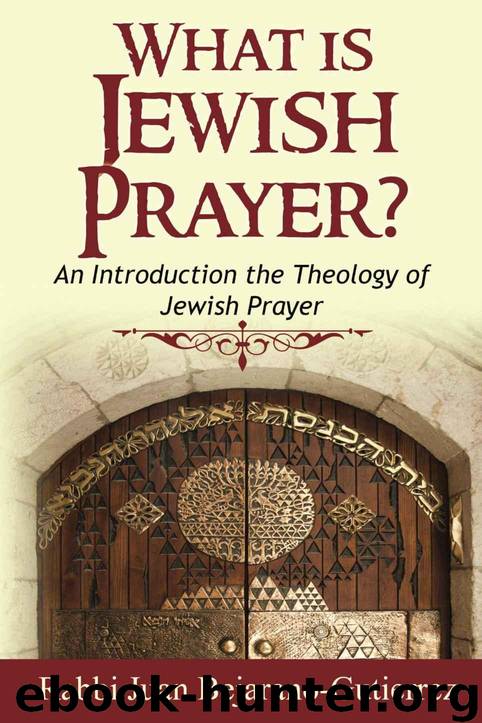What is Jewish Prayer?: An Introduction to the Theology of Jewish Prayer (Introduction to Judaism Book 2) by Juan Bejarano-Gutierrez

Author:Juan Bejarano-Gutierrez
Language: eng
Format: azw3
Published: 2016-06-25T22:00:00+00:00
CHAPTER 5
key prayers of the siddur
There are dozens and dozens of prayers in the siddur. I have chosen to discuss four major prayers or sections of the prayer book which are recited daily. These selections contain key concepts of Jewish theology.
Pesukei D'Zimra: The Verses of Praise
Before the Shema and the Amidah, the morning service includes the section called the Pesukei D'Zimra- the Verses of Praise which includes the Baruch She’amar (Blessed is He Who Spoke) and culminates with the section known as the Yistabach (Exalted be His Name). The Talmud tells us that a person should enter prayer with an inner feeling of joy. The origin of the Pesukei D'Zimra is credited to the Anshei Knesset Hagedolah. The Baruch She’amar (Blessed is He who Spoke) and the Yistabach (May Your Name be Praised) are also credited to the Men of the Great Assembly. [57]
The individual approaching G-d feels an infinite loss in using finite speech. To overcome this, we in effect plagiarize the words of King David to praise G-d. Our words are inadequate; yet we must try. The experience of trying and even failing to communicate with G-d reveals to us the need to stand in total surrender. Our feelings and perceptions cannot be fully expressed so we depend on the strength of previous generations as the Ashrei relates that "One generation relates your deeds to the next..." Yet even in doing so, the prayer Uvmekaholot (And in the Assemblies of Your People) tells us that G-d is worthy of praises even beyond all the words and praises of David.
The Amidah/The Shemoneh Esreh
The Amidah, the central prayer of traditional Judaism, is recited three times daily.[58] The Amidah begins with the phrase, “Blessed are thou L-RD our G-d, G-d of Abraham, G-d of Isaac, G-d of Jacob.” There are two ways to know G-d. We can know Him as the G-d of our fathers. We can also know G-d unmediated by our own experience. He is the G-d of our fathers, and yet each of the Patriarchs came to know Him individually through their personal encounter with Him. Each person must hear G-d's calling and come to terms with G-d in their own life.[59]
Rabbi Moshe Berger asked by what right do we imagine that we can approach the Creator of the Heavens and Earth and knock at his door. The Baal Shem Tob, the founder of the Hasidic movement stated:
“Prayer is an act of daring. Otherwise, it is impossible to stand in prayer before G-d. When imagining the greatness of the Creator, how else could one stand in prayer before Him? Prayer is a mystery, directed in its essence towards changing the order of the world. Every star and sphere is fixed in its order, yet man wants to change the order of nature, he asks for miracles. Hence, at the moment of prayer, man must lay aside his capacity for shame. If men had shame, they would, G-d forbid, lose the faith that prayer is answered.”[60]
The mitzvah (commandment) to pray is the permission.
Download
This site does not store any files on its server. We only index and link to content provided by other sites. Please contact the content providers to delete copyright contents if any and email us, we'll remove relevant links or contents immediately.
| Haggadah | Hasidism |
| History | Holidays |
| Jewish Life | Kabbalah & Mysticism |
| Law | Movements |
| Prayerbooks | Sacred Writings |
| Sermons | Theology |
| Women & Judaism |
The Power of Habit by Charles Duhigg(3130)
Man's Search for Meaning by Viktor E. Frankl(2670)
Mckeown, Greg - Essentialism: The Disciplined Pursuit of Less by Mckeown Greg(2440)
MOSES THE EGYPTIAN by Jan Assmann(2412)
Devil, The by Almond Philip C(2327)
The Complete Dead Sea Scrolls in English (7th Edition) (Penguin Classics) by Geza Vermes(2277)
Unbound by Arlene Stein(2268)
I Capture the Castle by Dodie Smith(2034)
Schindler's Ark by Thomas Keneally(1879)
The Invisible Wall by Harry Bernstein(1799)
The Gnostic Gospel of St. Thomas by Tau Malachi(1794)
The Bible Doesn't Say That by Dr. Joel M. Hoffman(1677)
The Secret Doctrine of the Kabbalah by Leonora Leet(1607)
Political Theology by Carl Schmitt(1579)
The Jewish State by Theodor Herzl(1533)
A History of the Jews by Max I. Dimont(1529)
The Dead Sea Scrolls Bible by Martin G. Abegg(1513)
The Book of Separation by Tova Mirvis(1486)
Oy!: The Ultimate Book of Jewish Jokes by David Minkoff(1369)
